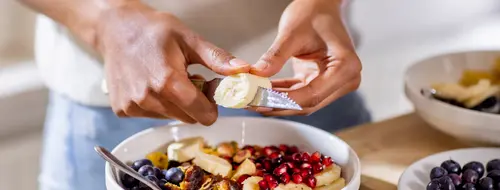I've had the symptoms of irritable bowel syndrome -- a gastrointestinal disorder -- for my whole life, but when I was younger, I didn't realize anything was wrong. My parents thought my cramps, bloating, constipation, and diarrhea were normal because they had similar symptoms. So I thought it was normal, too. As I grew up, I pretty much just coped with it. It was inconvenient, but I did my best.
But three years ago, when I was 27, after having some minor surgery done, I had the worst symptoms ever. I had severe stomach cramps and was in pain all the time. I had a lot of diarrhea. I think it was the stress around the surgery that triggered this flare, but it went on for months and months. Finally I went to my doctor, who sent me to a gastroenterologist.
At first he thought I had acid reflux, but the medication he prescribed actually gave me acid reflux, so that didn't work. After having an ultrasound and an upper GI endoscopy, which is an examination with a small camera that visualizes the esophagus, stomach, and upper part of the intestines, I was diagnosed with IBS. I had more tests earlier this year and discovered that I also have a problem with fat absorption. The doctor who ran the lab told me I needed to start a gluten- and dairy-free diet.
Surviving the Gluten-Free Diet
Gluten is the protein part of wheat and lots of other grains, as well as starch and other fillers found in processed foods and medications. I already knew a lot about this kind of diet from my research, and all along was fascinated with the whole approach. Until, that is, I realized I had to try it myself. I panicked. I was talking about not eating gluten for the rest of my life. The permanence of it hit me hard. I felt overwhelmed.
But I'm finding the transition easier than I expected. I stay away from processed food, unless it's labeled "gluten free" (and there's more and more of that available now). Otherwise, I find it's easier to cook from scratch. I've learned there are 30 gluten-free flours to use; Italians cook a lot with non-gluten flours, such as polenta and garbanzo. I'm also staying away from MSG, which I think triggers my symptoms. I'm finding a lot of fun dairy substitutes, and having success with baking. And the diet is working for me. I have fewer IBS symptoms and am just generally feeling healthier.
I don't have IBS as bad as some people -- I'm not stuck at my house, for instance, afraid to leave for fear of not being able to find a bathroom. But like a lot of people, I'm a little shy about it. We all use euphemisms at first -- we talk about our "tummy troubles," for instance. But I'm glad I've learned more about the disease and that I'm finally finding some answers that work for me.

